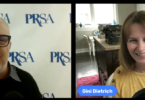via: iñaki de luis
The PRSA public relations team is charged with doing public relations for the public relations industry, a monumental task on any given day maybe – but especially so in the past couple days.
We frequently see head-scratching errors in judgment and avoidable ethical mishaps but rarely do we come across something so egregious as to stop us all in our tracks. The recent blog post by Lisa Kovitz on the Edelman website did just that.
The first thought that comes to mind is – who thought this was ok? As PR professionals we know the value of checks and balances. Nothing is ever leveraged for the public domain without several sets of eyes checking and analyzing it from all possible angles. This is how we advise our clients as practitioners and why I must believe Edelman has a policy in place to proof blog pieces before they are posted. In fact, according to Ms. Kovitz, the piece was first distributed as an internal memo and then someone had the bright idea to share it externally. I must believe that at the largest independent PR agency in the world, someone must have raised their hand and said “this is not OK.” In my opinion, if more than one set of eyes looked at the post and thought it was appropriate then my faith in this profession might just be lost.
In the wake of tragedy, it is often quite appropriate to raise awareness and draw attention to the matter – sometimes great things come from it. Making a sales pitch while criticizing the radio silence of mental health institutions that rightfully chose not to take advantage of a situation at a time when the public is trying to process the situation and, more importantly, show respect for those who actually lost a father, friend and loved one is utterly and completely unacceptable.
This is not only a prime example of the harm that can be done to the profession and why public relations professionals are often held in little esteem, it is also a lesson in how not to newsjack.
Let me dissect how Ms. Kovitz, in less than 600 words, lost credibility and respect:
You need not read any more than nine words into the piece before you come to her insinuation that Mr. Williams’ death was caused by depression. This is a conclusion she drew on her own. There is no conclusive evidence at this time that depression played a role in his decision on that fateful evening. There is speculation that it was a contributing factor to his death, but not confirmed at this time.
By the second sentence readers begins to see the dollar signs. Who uses the Latin term for ‘seize the day’ in the same breath as a tragedy – especially suicide?
Maybe if Ms. Kovitz had focused her piece on the topics covered in the second paragraph, the number of places that people in need of professional help can go to seek treatment, there wouldn’t be the stark backlash that there is. Unfortunately, that didn’t happen. While reporters for The Washington Post and CNN wrote thoughtful pieces that made the situation more understandable for readers, Ms. Kovitz instead pushed forth to make a pitch.
The only thing that would have made the first sentence of the third paragraph more blatant would be a flashing banner ad that alternated between the sentence posted and the phrase “Hire Us.” The sentence states: “At Edelman, we are in the business of helping our clients create or join public conversations.” Does anyone else feel as though they are sitting across the table from a group of Edelman staff being pitched for business? This is a person’s life lost and the author has taken the opportunity to point out that her agency loves to help its clients. Super!
This now brings us to the first bullet point in her lenticel, underneath the sentence stating how great Edelman is for the media work they do for their clients (and they might be, but this was not the blog to make that point). Ms. Kovitz followed up her thought by criticizing the organizations for NOT posting anything. “Perhaps they were trying to be non-exploitive or stay business as usual. While that approach may be the best for them, this event calls that strategy in to question.” Really? Gosh, maybe they were just trying to be respectful of the family as well as wait for the actual facts surrounding his passing to be detailed before they started a campaign to raise awareness. Additionally, the insinuation that these organizations aren’t already trying to raise awareness is irresponsible.
The second and third bullet points take the cake. ‘Hey, mental health organizations! I recommend you start finding experts and get them on television as quickly as possible. This won’t only raise awareness for depression but will do wonders for your brand.’ Need I say more?
Finally, to hammer her point home Ms. Kovitz went ahead and included in her concluding paragraph information about getting on camera in the immediate days following this tragedy; topping it all off by suggesting that the organizations will now be judged on whether or not they had a plan anticipating a celebrity suicide based on their media presence. Sadly this screams of ambulance chasing.
Perhaps I have gone too far in my own criticism of this piece, but not every moment is an OREO Super Bowl moment. As public relations professionals we have a code of ethics that includes enhancing the profession. To me, doing so means that we also have a duty to the public and that involves respect, honesty, accurate information and class. Ms. Kovitz’s blog post did nothing more than disgrace and embarrass a profession that already struggles under the weight of the too few who take the time to practice the profession “the right way.”
I sincerely hope that the PR profession takes this suicide and the reactions to it as a learning opportunity and that the discussion of suicide and depression become less taboo and more open in an effort to reduce instances of tragedies. We should not look at this as a “Seize the Day” opportunity and instead should offer our kindness, condolences and love to those grieving and wait to comment and offer thoughts on how to help those who need it after the facts of the matter have been properly presented.
Stephanie Cegielski, vice president of public relations, Public Relations Society of America








Thanks for sharing! In addition, I’d like to note that, of COURSE, organizations that advocate for and help those who battle mental health issues, depression, addition, etc., want their message to be heard. They want people to know where they can find help, contact a 1-800 number or chat with someone online in a time of need.
Kovitz’s article portrayed the assumption the communications pros at those organizations are either slow to the punch, lazy or fearful. They are none of those things. In my experience, the PR pros at most non-profit and mission-focused organizations are considerate, wise and trying to respect privacy. Instead of publicly touting their resources today, they are planning for how they can help more people every day. Mental health organizations will find a more appropriate time for their important messages to be heard.
Unsurprised. If anyone was going to be this crass, it was going to be someone from Edelman.
Well stated, Stephanie, and appropriate. There is sympathy. There is empathy. And there is exploitation of tragedy. Hopefully those who “approved” the Edelman blog post will take a moment to reflect and ask themselves this question: “How would I feel if that were MY father?”
I agree the Edelman post is tasteless and speaks poorly for the firm. Not everything is a business opportunity.
[…] Stephanie Cegielski is vice president of public relations for the Public Relations Society of America. A version of this article originally appeared on the PRSay blog. […]
Interesting to learn this started as an internal memo, since that is how it reads. Perfectly appropriate to have this discussion in the agency and directly with clients, but PR professionals should have understood how it would be perceived. That said, I was expecting far worse when I clicked on the link.
I could not disagree more with you, Stephanie. My comment on the Kovitz blog, copied below for reference, summarizes my thoughts.
________________________________
Lisa – Ignore the over-the-top hand-wringing. This is a perfectly valid and well-thought-out post, regardless of what some oversensitive PR pros below and elsewhere are saying.
It would be one thing if you were seeking to sell some vapid product. But alerting mental health professionals as to the ways that this tragedy could serve some good – vis a vis the opportunity to raise badly needed awareness on depression, suicide and other mental health issues – exemplifies the sort of “public interest” that the best communicators seek to serve.
As for the criticisms about your timing: I would ask your critics when would have been a more “appropriate” time for your message? One week from now, when the media have moved on and the chance has passed to raise awareness on critical mental health issues? PR 101 teaches that in today’s mediascape, speed is paramount in getting a message out. Yes, going “radio silent” as PRSA put it is the safe path for avoiding criticism. But what is more important in a case like this – protecting our own interests or communicating in a timely manner on an issue of critical importance.
Again, your message was valid and timely. Kudos to you and Edelman for having the courage to get it out there promptly despite the potential for criticism from certain circles.
Mike: I sincerely hope that your and Lisa Kovitz’s opinion are in the minority in our profession. Our colleagues and clients rely upon us to know how to communicate. That not only requires attention to the message, but the environment in which it is being delivered. Setting aside any value Lisa’s advice might have had to Edelman’s current or prospective clients, it showed a profound lack of awareness of the emotions surrounding Robin Williams’ death. Brad Phillips of Phillips Media Relations wrote about the 5C’s of crisis communication, with one of those C’s being caring (see http://www.mrmediatraining.com/2014/02/20/the-5cs-of-crisis-communications/). While Lisa’s blog post was not delivered as crisis communication, she should have at least considered the feelings of everyone following the Robin Williams story in communicating her advice so broadly. You ask when would have been a more appropriate time for her message. I say that it would have been more appropriate to deliver her message one-on-one to clients and prospects—not broadcast in a blog post. As for your comment about what you refer to as “over-the-top hand-wringing” by “oversensitive PR pros”, I’d say that sensitivity and introspection is what we bring to the table. It’s been said that PR practitioners can and should be the souls of the organizations they work for and represent. Once we stop considering how our messages and the media through which we deploy them will make people feel, we revert to that which many still regard us as being—nothing more than “spin doctors”.
read what I posted to that annon person. And on his/her behalf I apologize for his/her showing of ignorance on Christianity. Thank you.And…Two parents of the same party politics, huh? No wonder your a dem 🙂 (just jo2~.)Peaceseagapek010~
Mike, As a PR pro who has worked with Edelman and many firms around the globe over the last 24 years I can tell you this has nothing to do with being oversensitive or a PR pro. This is about being part of what we like to call humanity.
Now, I’m going to go do some research to see how many mental health awareness campaigns Lisa and Edelman were doing before Robin Williams’ death. In there will lie the answer to whether this was genuinely in the public’s interest or Edelman simply ambulance chasing.
[…] Tragedy is not a PR opportunity, Public Relations Society of America […]
One final thought…if one is truly sincere, how about picking up the telephone and reaching out to appropriate organizations to start a conversation rather than using a blanket the blogosphere post??
Unfortunately, this is the Kardashian-like world we are creating – being seen no matter how tasteless and closing the deal at any cost. Consider the GM technicians and others who feared informing “higher ups” that its product was defective, causing a number of deaths. Whether you are talking about the CIA dropping the intelligence ball or your favorite restaurant violating health codes, many American workers are under enormous pressure to keep their jobs. They’ll do whatever it takes.
Since this is on the PRSA blog, it seems like some disclosure is warranted. Is Lisa Kovitz a PRSA member? If she is, will the organization be reviewing her membership? How many PRSA members are at Edelman?
I just have to wonder how “piling on” to an already widely covered issue is “doing public relations for the public relations industry.”
Holly – Ms. Kovitz is not a PRSA member. Seventy of our 22,000 members are Edelman employees.
Rosanne Mottola
PR Manager, PRSA
Sorry folks, but I just don’t subscribe to the tenor of this analysis. Losing Robin Williams this way was a heart-breaking tragedy, but I see no harm or ethical breach in Ms. Kovitz/Edelman using the moment to remind mental health and social service agencies that there was a rapidly vanishing window of opportunity to quickly and visibly position their key messages about mental health and suicide prevention. Unfortunate as it is, there is a huge risk of the copy-cat effect following the highly publicized suicide of celebrities. Instead of the B2B pitch so many are commenting on, I saw something of a reminder in the public interest. Fact is, most community-based mental health associations don’t have the budget to hire the likes of Edelman and others, and I’m sure they know it. Yes, there was a lot of tasteless crap and behavior floated in the wake of this terrible tragedy; no, this was not part of it. Jeffrey S. Douglas, MS, APR, Fellow PRSA
[…] appropriate, then my faith in this profession might just be lost,” wrote PRSA Vice President Stephanie Cegielski.” This screams of ambulance chasing. Ms. Kovitz’s blog post did nothing more than […]
[…] Vice President, Public Relations for Public Relations Society of America who argued “Tragedy is not a PR opportunity” in a long post which itself has been accused of being exploitative (i.e. itself pushing a […]
As someone who grew up in a family with members who battled depression and attempted suicide, I have a tendency to immediately withdraw from news and discussions following a celebrity suicide. It provokes too many painful memories. I imagine that others with similar experiences would have this same tendency.
One of the most important things to consider in PR is who makes up your audience. Exactly who is it that you are trying to reach and with what message during this supposed window of opportunity?
Battling depression is daunting and ongoing for many families. There are no silver bullets, one shot inoculations or flash-in-the-pan PR tactics that will remedy this. Mental illness is not a sexy topic with a high-comfort level. It will take a long-term concerted effort to bring it out of the shadows of shame and despair.
Maybe all of you should have done more homework about depression and its devastating affects on those of us who have dealt directly with it before bandying it about.
I agree with Jeffrey Douglas (below) and am sorry I didn’t comment sooner. This much-discussed “carpe diem” post could have been worded with greater sensitivity, and with more guidance about how to walk that fine line between education and opportunism, but I do not see the situation as very different from the dialogues that take place around firearm regulation after a horrible mass shooting, to name only one example.
Who among us would retreat from offering a client with expertise on mental illness and suicide at a time when it is legitimately part of a national conversation? Lisa was not trying to force-fit a silly new product or (as I read) a solution for identity theft, but simply making the point that the national focus on Mr. Williams’ sad and very premature death raised an opportunity for qualified mental health professionals to be heard. In fact, her post raised an interesting point: is it an opportunity, or in fact, an obligation?
Ethical professionals may disagree, but some of the hysteria and stone-throwing, in my view, is inappropriate, self-serving and not worthy of us as a community. We can do better.
[…] did she go wrong? After a quick glance at her blog post, the answer becomes abundantly clear. This PRSA article does a good job summing it up for us, as […]
don’t really agree, almost everything can be reversed using the proper strategy and sustained over time.
Diseño Web
I’m out of league here. Too much brain power on dilayps!